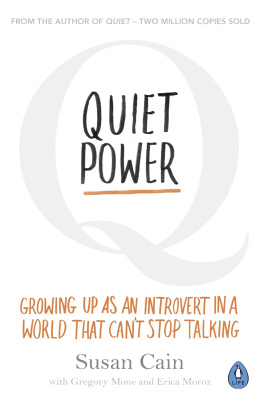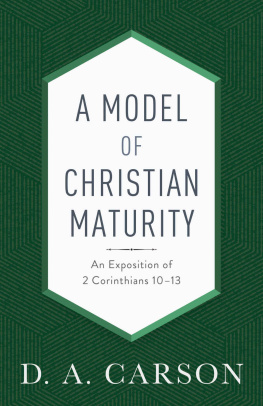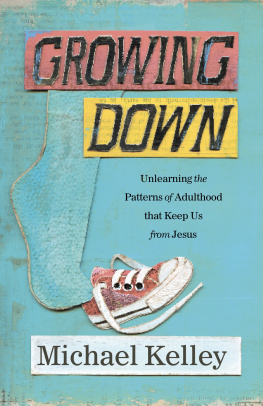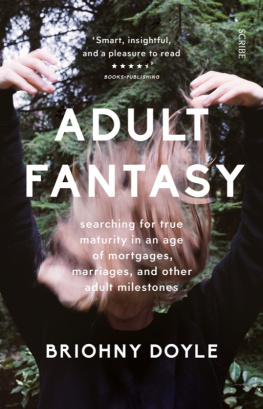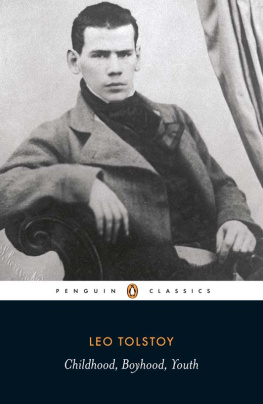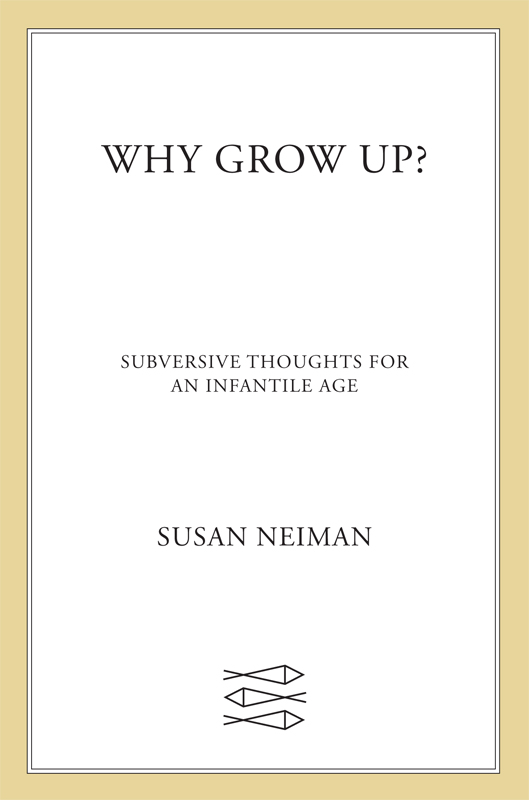Contents
Guide

The author and publisher have provided this e-book to you for your personal use only. You may not make this e-book publicly available in any way. Copyright infringement is against the law. If you believe the copy of this e-book you are reading infringes on the authors copyright, please notify the publisher at: us.macmillanusa.com/piracy.
For Leila
You need not be Peter Pan to feel uneasy about the prospect of becoming adult. Indeed, its easy to argue that Peter Pan, most drastically imitated by Michael Jackson, is an emblem of our times. Being grown-up is widely considered to be a matter of renouncing your hopes and dreams, accepting the limits of the reality you are given, and resigning yourself to a life that will be less adventurous, worthwhile and significant than you supposed when you began it. Simone de Beauvoir ended the third volume of her autobiography with the reflection that there wasnt much of the world she hadnt seen: the opera of Peking, the arena of the Huelva, the dunes of El Oued, the dawns in Provence, Castro talking to five hundred thousand Cubans, the white nights of Leningrad, an orange moon over the Piraeus. Not only did she travel the world at a time when, unlike ours, such travel could hardly be taken for granted; the loves and friendships, the meaningful work and the acclaim she received for it were nearly as numerous and varied as the places she saw. Its hard to imagine a life more full or less wasted. Yet she concludes the enviable list of her travels with a look back at the girl she once was, gazing at the gold mine at my feet: a whole life to live, and concludes that she was cheated. Some writers argue that few people these days want to grow up. But if adulthood is a matter of feeling, in ones more honest moments, that one was cheated, who can blame them?
Can philosophy help us to find a model of maturity that is not a matter of resignation? (For the record, my Oxford Thesaurus lists philosophical as a synonym for resigned.) I believe that it can, and the best place to begin is Immanuel Kants description of the process of reasons coming of age towards the end of the Critique of Pure Reason . Readers may be forgiven for ignoring it. The Critique of Pure Reason (1781) is at once the most important and the worst-written book in the history of modern philosophy. Kant himself wrote that it was too long and too dry, before poignantly adding that it is not given to everyone to write so subtly and gracefully as David Hume, or so profoundly and elegantly as Moses Mendelssohn. True enough. Bertrand Russell was not the only reader to admit to falling asleep before he reached the end. Those who persevere, however, will find that his model of coming of age can be very compelling.
The infancy of reason is dogmatic. Small children incline to take what they are given as absolute truth. What perspective would allow them to question it? Those who suffer abuse at the hands of parental or priestly authority need years to realize that abuse is not simply part of the furniture of the universe if they ever realize it at all. In happier cases, each step the child takes seems to confirm both her own powers and the transparency of a world that initially seemed mysterious. She learns that spoons (and rattles and pudding) regularly fall down and not up when you drop them, that balls (and trucks and kittens) are objects that persist even when they roll behind the curtain. As her own capacities grow, the world becomes increasingly comprehensible. Why shouldnt she assume that both are unlimited? Each day she understands a little more, each day another secret of her world is unravelled. For the small child, the dogmatic metaphysics of the seventeenth-century philosopher and consummate optimist Leibniz will seem obvious: had we but world enough and time, we would be able to know everything and to understand that this world is the best of all possible ones. What else would make sense?
The next step of reason is scepticism, and though the word adolescence was not invented in Kants day, he describes all its symptoms: the peculiar mixture of disappointment and exhilaration that accompanies the teenagers discovery that the world is not the way it should be. Even at their very best and we seldom are parents and teachers have failings. (And those of us who have become parents and teachers ourselves have also been adolescents, just as surely as the rest of you.) They know less than we thought they did, they can offer fewer solutions than we hoped. Even when they do not lie, they did not tell us all they could have; they want to shield us in the wrong ways and fail to protect us in the right ones. They embarrass us with habits and beliefs they inevitably acquired in an earlier era; they criticize what they dont understand and hang on to times that have changed. Why shouldnt we conclude that whatever truths and rules we learned from them were misguided; indeed, that the very ideas of truth and rule deserve to be laid to rest? Why shouldnt we move from boundless trust in the world to boundless mistrust?
Kant says this step is more mature than the wide-eyed credulity of reasons childhood, and therefore necessary and valuable. (To be sure, he never had to raise an adolescent.) But the wild swing from endless trust to permanent distrust is not yet maturity. Unsurprisingly, maturity is Kants metaphor for his own philosophy, which should give you the wisdom to find a path between mindlessly accepting everything youre told and mindlessly rejecting it. Growing up is a matter of acknowledging the uncertainties that weave through our lives; often worse, of living without certainty while recognizing that we will inevitably continue to seek it. Such a standpoint is easier to describe than to consistently maintain, but then again, whoever said growing up would be easy?
The problem with all this, at first glance, is not that its hard but that its boring. Worse than boring, it sounds resigned. Is there more to this standpoint than you could get from your harmless but well-meaning uncle, growing a belly, who tells you that life will be neither as wondrous as you thought in your childhood nor as tormented as you thought in your adolescence, and its time to buck up and make the best of it? Banal as it is, this statement is true, but it hardly seems worth striving for. Why not just skip Kant and listen to the Rolling Stones? If you try sometimes, you just might find you get what you need. And speaking of harmless uncles: Kants life hardly seems a model of an adulthood to which youd aspire. He never travelled further than forty miles from the place he was born, he never married; even the one rumour we have of a love affair remains unconfirmed. His adult life consisted of a routine of lectures, academic chores and writing so demanding and regular that his neighbours were said to set their watches by the daily walk he took to maintain his weak constitution. The poet Heinrich Heine went so far as to say that Kants life-history was easy to describe, for he had neither a life nor a history.
That same poet, however, also described Kant as a rebel who stormed the heavens and made the French revolutionary Robespierre seem humdrum. Nor was Heine alone. Most of Kants younger contemporaries felt much the same. We begin to see why when we turn to Kants most famous discussion of maturity, which occurs at the beginning of the Enlightenments best-known essay. What is Enlightenment? ( 1784 ) defines it as reasons emancipation from its self-incurred immaturity. We choose immaturity because we are lazy and scared: how much more comfortable it is to let someone else make your decisions! If I have a book that takes care of my understanding, a preacher who takes care of my conscience, a doctor who prescribes my diet, I need not make any effort myself. I need not think, so long as I can pay; others will handle the business for me. Even Kant could write straightforward sentences when he was writing for the Berlinische Monatsschrift , the eighteenth centurys version of The New York Review of Books which makes it all the more puzzling that so few people bother to read, or anyway to remember, more than the first few.





